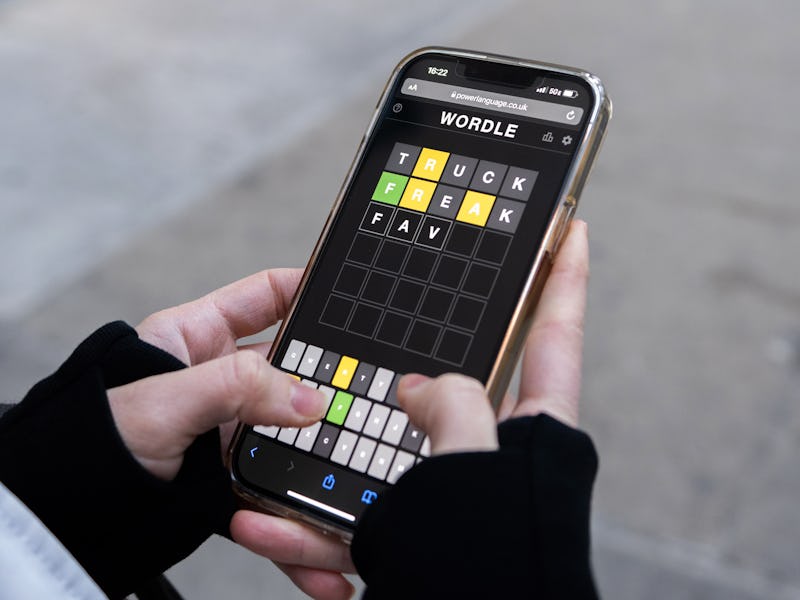Wordle Has Thousands of Words Left, But Feels Like It’s Already Over
Its days — and words — are numbered.

Think back to early 2022, and you may remember one game dominating discussions more than any other for months. While From Software’s behemoth Elden Ring had its time to shine, nothing could compare to the cultural force that was Wordle. But while the days of its omnipresence are long gone, Wordle is still quietly carrying on as one of many games available through The New York Times. Wordle editor Tracy Bennett recently spoke about the possibility of the game reaching the end of its word list, and while it may be a long way off, the change that could bring has me thinking about Wordle’s legacy and the transformations it’s already gone through.
The New York Times did not immediately respond to Inverse’s request for comment.
Bennett’s comments came in a recent TikTok Q&A hosted by the New York Times’ games account. When asked whether Wordle was running out of five-letter words to use as solutions, Bennett responded that the database has somewhere in the neighborhood of 2,300 words left, as spotted by Eurogamer. So while the word bank is nowhere near being exhausted entirely, since part of the Wordle editor’s job is to prune words that are too obscure or profane, the end could be more nigh than it appears.
Even Elden Ring’s Malenia was no match for the power of Wordle.
The solutions Bennett proposed would no doubt be controversial. One option is to simply start adding plurals and past-tense words, while another is to repeat words that have already been used. Repeating words might not be that big of a deal for newer players, but for anyone who’s been there from the beginning (there have to be some out there, right?), part of the game’s appeal was having a brand-new challenge every day. Whatever impact any of these adjustments would actually have on the experience of players, talk of the game changing makes me weirdly nostalgic for its heyday.
Even with the end of its database so far away, in some way, it feels like Wordle has already reached its conclusion. Not as a game, of course, which is still available every single day, but as a cultural phenomenon. And to a large extent, that phenomenon was the game.
There are plenty of word games out there. The New York Times alone has multiple others, including the recent hit Connections, where you match words, and now even emojis, that share unexpected links. Then there’s Puzzmo, co-created by Zach Gage, developer of SpellTower and Really Bad Chess, which hosts numerous daily word games and other puzzles.
But none of those has come close to becoming a household name and a daily obsession in the way that Wordle once was. It helped that Wordle launched at a time when more people were still taking precautions against illness seriously and spending lots of time indoors and alone as a result. From the start, Wordle was as much a social activity as it was a game, with an easy way to share scores built in. A simple grid of colored squares could tell you how you ranked against your friends, making it the perfect daily check-in for a group text or a way to brag online.
Wordle achieved the kind of success few games can even dream of for a couple months.
The game’s simple design also helped. Wordle was and still is a game you can play in under a minute and have a pretty good chance of at least getting the word right, if not achieving an enviable score. Compared to games like the crossword or Connections, it’s incredibly quick and straightforward.
Maybe that’s part of why even the possibility of the game changing stirs up unexpectedly strong feelings. Wordle was, for a time, a ritual that connected us in our isolation, and rituals aren’t meant to change.
But Wordle has already changed. In January 2022, at the height of its popularity, Wordle creator Josh Wardle sold the game to The New York Times for a price reportedly in the seven figures. At the time, there was concern that The New York Times would change the game in some major way, or start charging for it. While that didn’t happen — changes were limited to some cuts and additions to its word list — simply moving it from its old URL felt like a shift to what had become a comfortingly familiar routine.
With thousands of words left to burn through and contingency plans already in place, there’s no reason to worry that Wordle will actually disappear any time soon. But if it does fundamentally change or even shut down at some far future date, it feels like Wordle has already served its purpose. In some way, the Wordle that we once knew and played without fail every morning is already gone. It was fun while it lasted.